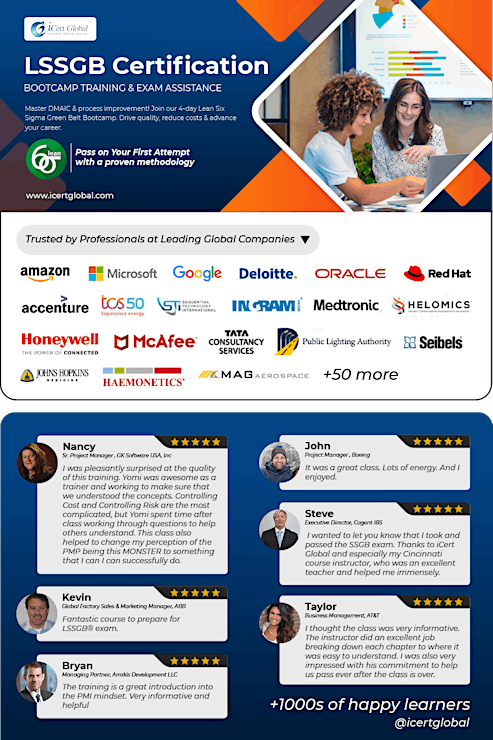
About this Event
Lean Six Sigma Green Belt Weekend Bootcamp
Fast-track your career in process improvement with our Lean Six Sigma Green Belt Certification Weekend Bootcamp — a focused, in-person training program designed for working professionals. This IASSC-aligned Lean Six Sigma Green Belt Training combines essential theory with hands-on learning to help you master waste reduction, process optimization, and measurable quality improvement.
Through real-world case studies and expert instruction, you’ll gain the skills to apply DMAIC methodology (Define, Measure, Analyze, Improve, Control) — driving efficiency, enhancing performance, and leading impactful projects in your organization.
What You’ll Learn
In this practical, career-advancing program, you’ll learn to:
- 4 Days of Instructor-Led Weekend Classroom Training
- Apply Lean Six Sigma tools to improve process efficiency and quality management
- Perform data analysis, identify root causes, and apply statistical testing
- Lead cross-functional teams through process and cultural transformation
- Execute full-cycle DMAIC projects that deliver tangible business results
- Prepare confidently for the IASSC Green Belt Exam using practice tests and case studies
Upcoming Weekend Batches
Nov 15-16 & 22-23, 2025 | Jan 17-18 & 24-25, 2026 | Feb 21-22 & Feb 28-01-Mar, 2026
For additional dates or batch details, .
Group Discounts:
- 10% OFF for 3–5 participants
- 15% OFF for 5–10 participants
- 20% OFF for 15+ participants
Training Includes
- 4 Days of Instructor-Led Weekend Classroom Training
- Fully IASSC-Aligned Curriculum
- 2 Full-Length Practice Tests & Case Studies
- 365 Days of E-Learning Access
- Certified Exam Fee Included
- Hands-On Project Coaching from Experts
- 100% Money-Back Guarantee*
- 32 Hours Live Training + 20 Hours Guided Self-Study
- Access to Real-World Lean Six Sigma Case Studies
Who Should Enroll
This bootcamp is ideal for:
- Quality & Operations Managers
- Project Managers & Team Leaders
- Business Analysts & Consultants
- Professionals in Manufacturing, IT, Healthcare, Finance, and Services
- Aspiring Lean Six Sigma Green Belts & Yellow Belt Holders
Why Choose iCertGlobal
iCertGlobal is a globally recognized leader in Lean Six Sigma and Quality Management Training. Our instructor-led programs are designed to blend theory with practical application — ensuring every learner gains the confidence and expertise to drive operational excellence.
Trusted by professionals worldwide, iCertGlobal offers IASSC-standard curriculum, flexible learning schedules, and comprehensive support to help you pass your exam on the first attempt.
Phone: +1 713-287-1187
Email: [email protected]
Webite: www.icertglobal.com

Day 1
🕑: 09:00 AM - 05:00 PM
Define Phase & Project Leadership
Info: Module 1: Introduction to Six Sigma & Project Leadership
Overview of Six Sigma levels (Green, Yellow, Black Belt)
History, philosophy, and business drivers
Roles and responsibilities of Green Belt leaders
Project leadership and team-building fundamentals
Module 2: Project Selection & Business Case Development
Frameworks to identify high-impact projects
Conducting preliminary financial analysis and benefit estimation
Building a strong business case for executive sponsorship and support
Module 3: Project Chartering & Stakeholder Alignment
Defining effective project charters (scope, goals, timelines)
Performing stakeholder analysis and creating SIPOC diagrams
Capturing Voice of the Customer (VOC) and translating into Critical-to-Quality (CTQ) metrics
Day 2
🕑: 09:00 AM - 05:00 PM
Measure Phase & Data Analysis Foundations
Info: Module 4: Process Mapping & Data Collection Planning
Process documentation: value stream mapping, detailed flowcharts
Data collection planning: what to measure, how to measure, and ensuring integrity
Module 5: Statistical Foundations for Green Belts
Descriptive statistics: measures of central tendency and dispersion
Probability concepts: normal distributions, Z-scores, and interpreting variation
Module 6: Measurement System Analysis (MSA)
Gage Repeatability & Reproducibility (GR&R) using ANOVA methods
Attribute agreement, %GRR, and measurement system adequacy
Day 3
🕑: 09:00 AM - 05:00 PM
Analyze & Improve Phases
Info: Module 7: Process Capability & Hypothesis Testing
Process capability metrics: Cp, Cpk, Pp, Ppk, DPMO, and sigma levels
Understanding hypothesis testing: Type I & II errors, p-values, power, and appropriate test selection (t-tests, chi-square, ANOVA)
Module 8: Correlation, Regression & Root Cause Analysis
Creating scatter plots, calculating correlation coefficients, and regression equations
Distinguishing correlation vs. causation, interpreting R-squared values
Applying root cause tools: Multi-Vari studies, FMEA, fault tree analysis, systematic brainstorming
Module 9: Design of Experiments (DOE) Fundamentals
DOE concepts: full & fractional factorials, screening designs
Identifying main effects and interactions, using Pareto charts, and optimizing factor settings
Day 4
🕑: 09:00 AM - 05:00 PM
Improve (continued) & Control Phase
Info: Module 10: Solution Implementation & Pilot Testing
Evaluating and prioritizing improvement solutions
Conducting cost-benefit analysis, solution selection matrices, and pilot studies
Risk mitigation and planning full-scale rollout
Module 11: Statistical Process Control (SPC) & Control Plans
Control chart theory, rational subgrouping, and calculating control limits
Selecting appropriate charts (X-bar/R, I-MR, p, c, u)
Developing robust control plans—measurement frequency, responsibilities, and reaction protocols
Module 12: Project Closure & Financial Validation
Calculating and validating hard and soft savings
Financial verification and reporting results
Documenting lessons learned and creating executive presentations for certification
Event Venue & Nearby Stays
10 Dorrance St, 10 Dorrance Street, Providence, United States
USD 1919.52












